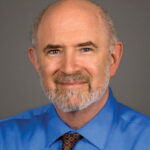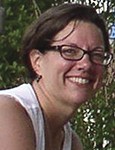Consider Being a JSM Docent
At JSM 2014 in Boston, you may have noticed a few of our attendees donning maroon “JSM DOCENT” ribbons. With JSM 2015 in Seattle around the corner, I thought I would follow up on this initiative. I was fortunate enough to sit down with Mary Kwasny, the board’s third-year Council of Chapters representative who led the pilot docent program on my behalf. She is an associate professor of preventive medicine in the Feinberg School of Medicine at Northwestern University, with an ScD from Harvard.
I have been told, but personally cannot remember, there was a time when the ASA organized volunteers at JSM to help welcome and assist first-time attendees. We continue to hold the First-Time Attendee Orientation and Reception on Sunday evening of the conference. Given how large JSM has grown and how many first-time attendees we have had, approximately 1,500 in Boston last year, it seemed like a good idea to enlist previous attendees to answer newcomers’ questions and offer assistance throughout the conference. Mary—with her talent, enthusiasm, and effervescence—was the ideal person to take on locating, training, and organizing these volunteers to serve first-time attendees!
Many of our members might not be familiar with the term. What is a docent?
You will find docents in many museums or art galleries. They act as guides or educators for those institutions, and they typically do this on a volunteer basis. Although I was not very good in the classics, I did take Latin in high school, and I believe the term comes from the Latin docere, meaning to teach.
What’s the purpose of the docent program at the JSM?
JSM is an incredibly large meeting, attracting approximately 6,000 statisticians in one location. Historically, there are at least 1,000 “first-timers” at the meeting as well, far exceeding the number I would have expected! I couldn’t help but wonder how many of those first-timers may be a bit intimidated or not return to future JSMs because they, possibly, felt out of place. Volunteers are asked to serve as docents to be available to answer any questions about JSM first-timers (or anyone else) may have.
Who benefits from this and how?
That is a great question. So many people have the potential to benefit! First, and most obviously, first-timers have an easy-to-identify point person to ask questions of. Imagine being lost in a small city and knowing that all you had to do was look for a person with a maroon ribbon who would answer any question! Second, as we are asking for younger ASA members to serve as docents (our more esteemed colleagues might intimidate a newcomer), they may be better able to remember what it was like the first time they attended the meetings and know best how to assist others. Third, this is the perfect opportunity to start volunteering for service within the profession. Fourth, serving as a docent also helps members learn the ins and outs of JSM and working with the ASA staff. Finally, I think this will benefit all JSM attendees. Someone who might not have returned to the meetings may make a connection with a docent. They might then return and serve as a docent themselves, and, who knows, maybe someday even serve as JSM program chair!
Why did organizing this pilot docent program appeal to you?
Personally, I love JSM! Sure, smaller, “on topic” meetings, such as the Conference on Statistical Practice, are great, too. But at JSM, you can really expand the field of applications for specific methods, see what else is going on in areas where you may not have time to remain up to date, and connect and network with colleagues who work in your area of specialty. Apart from hoping to enhance the JSM experience, I think many of us are tempted to shy away from an overwhelming experience like JSM. Had I not attended it with seven of my classmates the first year, I may not have returned. I think back to all I experienced at subsequent JSMs, and I would have missed some truly incredible moments.
How did the experiment work at last summer’s JSM?
As a pilot program, we learned a lot. Frankly, my probability training should have told me that in a sea of 6,000 people, trying to find one of 40 would be difficult! We started the pilot really not knowing how much or what kind of training the docents would need, or where they would be asked the most questions. We teamed up at the last minute with the Women’s Caucus, which hosts the First-Time Attendee Orientation and Reception. That proved to be the best place for our docents to meet and greet the first-timers.
What was the feedback from the volunteers you recruited?
Most of the surveys we received back were positive. Obviously, a big issue was the lack of visibility. Boston 2014 was a small pilot program, and there was a lot to learn about organizing and how best to “use” the docents! Most of the docents felt that serving as a docent positively affected their experience at JSM, and a few were happy to have some of the first-timers recognize them at other, larger events like the President’s Invited Address.
What did you learn that you might do differently this summer?
We definitely need more docents! We plan to reach out to the Women’s Caucus earlier to see if we can offer our support, and spreading the word about the docent program will help raise awareness so people can sign up.
How can people volunteer to be a docent for this summer’s JSM?
If anyone is interested or wants to know more, please send an email to JSMDocent@amstat.org to express your interest or ask questions. Anyone who has attended several JSMs in the past, is available to attend the First-Time Attendee Orientation and Reception, and would be comfortable answering questions throughout the conference is welcome to volunteer!
Once they send in an email, what will happen next, and what, if anything, will they be asked to do before JSM?
We will send you a docent guide to make sure you have access to the information someone may ask you. Then, pick up a docent ribbon at the registration desk and come to the docent orientation, to be held just before the first-timers orientation on Sunday at the meeting. This is intended to be “situational mentoring,” so we ask very little except for a few hours of your time at JSM. Consider it; we can use your help!
Thanks for organizing this again at this year’s JSM, Mary!



















